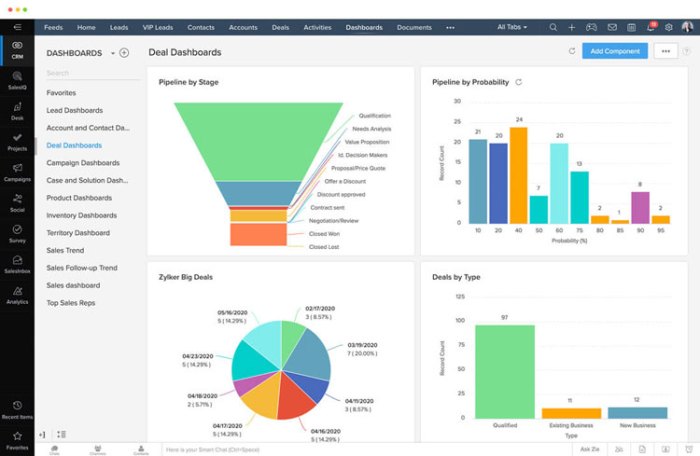In today’s dynamic business environment, efficient project management and robust customer relationship management (CRM) are no longer optional; they’re essential for success. Integrating these two crucial aspects through project management software with CRM capabilities offers a powerful synergy, streamlining workflows and boosting overall productivity. This comprehensive guide delves into the intricacies of such software, exploring its benefits, features, selection process, and implementation strategies.
Understanding the Synergy: Project Management and CRM Integration
Traditionally, project management and CRM operated as separate entities. Project management focused on internal processes, task assignments, timelines, and resource allocation. CRM, on the other hand, concentrated on external interactions, customer data management, sales pipelines, and marketing automation. However, the lines blur when considering the interconnectedness of projects and customer relationships. Many projects are directly driven by client needs, and successful project delivery directly impacts customer satisfaction and loyalty.
Integrating project management and CRM functionalities eliminates data silos, fostering a holistic view of projects and their impact on customer relationships. This integration allows for seamless information flow, improved collaboration, and enhanced decision-making. Key benefits include:
- Improved Customer Satisfaction: Real-time project updates and transparent communication keep clients informed and engaged, leading to higher satisfaction.
- Enhanced Collaboration: Teams can easily access and share project-related information, fostering better collaboration between internal teams and external clients.
- Streamlined Workflows: Automation of tasks and processes reduces manual effort, freeing up time for more strategic activities.
- Better Resource Allocation: Accurate project forecasting and resource utilization based on client needs optimizes resource allocation.
- Increased Revenue and Profitability: Improved efficiency and customer satisfaction translate to increased revenue and improved profitability.
- Data-Driven Decision Making: Comprehensive data insights provide a clearer understanding of project performance and customer behavior, enabling data-driven decisions.
Key Features of Project Management Software with CRM
Effective project management software integrated with CRM offers a range of features designed to streamline workflows and enhance customer relationships. These typically include:
Project Management Features:, Project management software with crm
- Task Management: Assign tasks, set deadlines, track progress, and manage dependencies.
- Timeline Management: Visualize project timelines, identify potential bottlenecks, and manage schedules effectively.
- Resource Management: Allocate resources efficiently, track utilization, and prevent over-allocation.
- Collaboration Tools: Facilitate communication and collaboration among team members and clients through features like shared documents, instant messaging, and video conferencing.
- Reporting and Analytics: Generate reports on project progress, resource utilization, and overall performance.
- Kanban Boards and Agile Methodologies Support: Visualize workflow and track progress using Kanban boards and support for agile methodologies like Scrum.
- Time Tracking: Accurately track time spent on tasks for accurate billing and project budgeting.
CRM Features:
- Contact Management: Store and manage client information, including contact details, communication history, and project involvement.
- Lead Management: Track leads, manage sales pipelines, and nurture potential clients.
- Sales Automation: Automate sales processes, such as email marketing and follow-ups.
- Customer Support: Manage customer inquiries and provide support through various channels.
- Customer Segmentation: Segment customers based on various criteria for targeted marketing and communication.
- Reporting and Analytics: Analyze customer data to gain insights into customer behavior and preferences.
Integrated Features:
- Project-Specific Customer Communication: Direct communication channels linked to specific projects for efficient updates and feedback.
- Automated Client Notifications: Automatic updates on project milestones and progress sent directly to clients.
- Centralized Data Repository: All project and customer data stored in a single, accessible location.
- Real-time Visibility: Both internal teams and clients have real-time visibility into project progress.
Choosing the Right Project Management Software with CRM
Selecting the right software requires careful consideration of several factors:

Source: selecthub.com
- Business Needs: Clearly define your project management and CRM requirements.
- Budget: Determine your budget and explore different pricing models (subscription, one-time purchase).
- Scalability: Choose software that can scale with your business growth.
- Integrations: Ensure compatibility with existing software and tools.
- User-Friendliness: Opt for intuitive and user-friendly software that is easy to learn and use.
- Customer Support: Look for software with reliable customer support and documentation.
- Security: Prioritize software with robust security features to protect sensitive data.
Implementation and Best Practices
Successful implementation requires a well-defined plan:
- Data Migration: Plan and execute the migration of existing data from legacy systems.
- User Training: Provide comprehensive training to users on how to effectively utilize the software.
- Process Optimization: Optimize workflows and processes to leverage the software’s capabilities.
- Change Management: Manage the transition to the new software effectively to minimize disruption.
- Ongoing Monitoring and Improvement: Continuously monitor performance and make adjustments as needed.
Frequently Asked Questions (FAQ)
- Q: What are the benefits of using project management software with CRM? A: Improved customer satisfaction, enhanced collaboration, streamlined workflows, better resource allocation, increased revenue, and data-driven decision-making.
- Q: How much does project management software with CRM cost? A: Costs vary significantly depending on the features, scalability, and vendor. Pricing models include subscription-based and one-time purchases.
- Q: What are some popular project management software options with CRM integration? A: Many platforms offer this integration, including but not limited to Salesforce, HubSpot, Zoho CRM, and Monday.com. Research is key to finding the best fit for your needs.
- Q: How can I ensure successful implementation? A: Careful planning, comprehensive user training, process optimization, effective change management, and ongoing monitoring are crucial for success.
- Q: What are the key differences between standalone project management software and software with integrated CRM? A: Standalone PM software focuses solely on project management tasks. Integrated solutions combine project management with CRM functionalities, offering a holistic view of projects and their impact on customer relationships.
Conclusion: Project Management Software With Crm
Project management software with CRM capabilities represents a significant advancement in business operations, enabling organizations to manage projects and customer relationships more effectively. By leveraging the power of integration, businesses can streamline workflows, enhance collaboration, improve customer satisfaction, and ultimately drive growth and profitability. Choosing the right software and implementing it effectively are key to realizing these benefits.
Call to Action
Ready to transform your project management and customer relationship management? Explore the leading project management software options with integrated CRM features and discover how you can optimize your business processes for enhanced efficiency and growth. Start your free trial today!
Question & Answer Hub
What are the benefits of using project management software with CRM integration?

Source: ecomstrive.com
Improved client communication, enhanced project visibility, streamlined workflows, better resource allocation, and increased overall efficiency are key benefits.
How does CRM data improve project management?
CRM data provides valuable context about clients, allowing for personalized project management, proactive issue resolution, and improved client satisfaction.
What are some examples of software that integrates project management and CRM?
Many popular platforms offer this integration; researching specific options based on your business needs is recommended. Look for features explicitly mentioning this combined functionality.
Is CRM integration suitable for all businesses?
While beneficial for many, the suitability depends on business size and complexity. Smaller businesses might find standalone tools sufficient, while larger organizations often benefit greatly from the integration.
